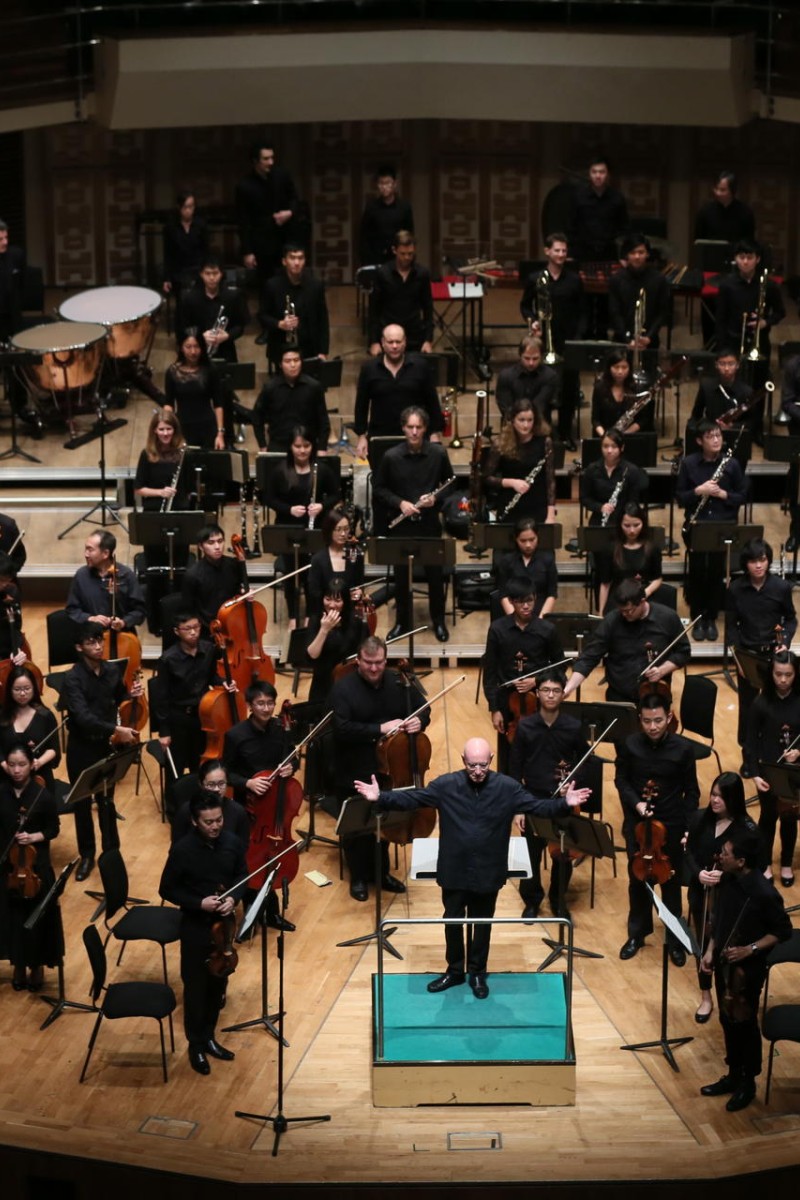 Share the Stage brought 48 student musicians under the age of 25 to play with the professional musicians of the Hong Kong Philharmonic and conductor Christoph Eschenbach
Share the Stage brought 48 student musicians under the age of 25 to play with the professional musicians of the Hong Kong Philharmonic and conductor Christoph EschenbachWith music, we hear all the instruments blend together to create a song. But start taking them out one-by-one, and that same piece of music slowly becomes unrecognisable. Play just one part from one instrument, and you’d never know what the song would sound like as a whole.
This was the challenge for 48 student musicians when rehearsing for their performance of Ravel’s La Valse alongside the professional musicians of the Hong Kong Philharmonic Orchestra for the Share the Stage programme.
“When you practice on your own, by yourself, you have no idea what you are going to play,” explains Gordon Cheung Shiu-wun, age 18 and a music major at City University.
"If you take a single part to listen to, it is really hard to know what you are going to play. So I usually practise with the recordings. When you listen to the recordings, you know what is going on in the piece and you know what others are doing."
This is crucial, because being in an orchestra is like a team sport: everyone needs to work together.
Gordon played percussion in Share the Stage two years ago. "I was playing the triangle, and I needed to wait for 200 bars of rest for just one single stroke."
The students next to him - cellist Philip Leung, harpist Katie Lo Sin-yan, and violinist Hazel Yeung Man-yin - all laugh. They understand that even counting can be a challenge. Mess it up, and you'll come in at the wrong place and throw the whole thing off.
"Apart from playing together, we all have to be really careful on counting for ourselves," says Hazel, a 16-year-old student at Renaissance College. "I think the rhythm and the coordination between different sections of the orchestra is really difficult, particularly for this piece."
For Katie, 13, a student at Good Hope School, playing as part of an orchestra is unusual. "I'm used to playing solo instruments like piano and harp, so I need to learn how to cooperate to play in an orchestra," she says. "This piece is actually quite challenging for non-professional orchestra members."
"It's more challenging [this year]," Gordon agrees, comparing his experience from two years ago. "The principal percussionist of the Hong Kong Philharmonic has given me an opportunity to play different parts, instead of just one. So it's more challenging to handle all the different parts together."
The students also have the added pressure of being conducted by Maestro Christoph Eschenbach. "He is a really famous conductor," Gordon says. "This was one of the biggest reasons for me to join the programme again this year."
But even for those who regularly play in orchestras, La Valse is not a piece you can simply waltz your way through, says Diocesan Boys' School student Philip, 13. "This piece is really challenging since it is not a set rhythm," says Philip. "You have to be really familiar with it, and to really interact with the conductor."
Philip has been around music his whole life - his father is a concert master with the Hong Kong Philharmonic, and all his family members are musicians.
Katie also comes from a musical family, and says she gets support from them and society. "Hong Kong accepts both pop music and classical music. It gives us a lot of opportunities," she says.
Hazel agrees, but thinks Hong Kong could be more open. "I think that music is valued less here than other professions, like medicine or law," she admits.
All four students say that the recent MTR crackdown on large instruments won't help musical development in the city. "This is a really big insult to musicians," says Philip.
Hazel found it confusing. "To me it feels a bit sudden," she says, "it's not like people suddenly just started playing large instruments this year."
But aside from the inconvenience of transportation, the four artists agree that there are plenty of options to explore music in Hong Kong, if you're passionate about it.
"My advice is really simple," says Gordon to anyone interested in classical music. "Attend concerts. It's really important. In Hong Kong, there are a lot of professional musicians, a lot of good orchestras. Go attend a concert. It's a valuable opportunity to help you develop yourself and learn to appreciate others. This is what real musicians need to do."
